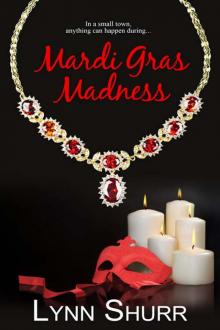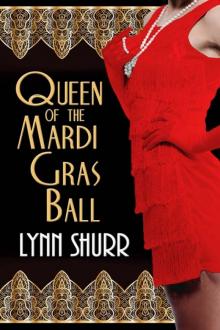- Home
- Lynn Shurr
Mardi Gras Madness Page 5
Mardi Gras Madness Read online
Page 5
“You’ll have to go around back and get T-Bob. He’s probably in the barn with his damned cows. Who knows where Pearl is hiding!”
“I’m sure I can get you into the house, Miss LeBlanc,” Laura offered.
“T-Bob knows how I like things done. Now go around back and find him.”
Laura accepted the order as a guest must and took a gravel walk to the rear of the house. She threaded through a formal garden among tree-sized camellias and immense azaleas clipped into tight mounds and came out of the maze at a thick hedge of shiny-leafed ligustrum. A whiff of barnyard and the lowing of cattle hinted at the view the ligustrum blocked. Laura passed through a gate and faced a line of thoroughly modern metal and concrete cattle barns. Holding pens and pasture stretched beyond the buildings. Laura picked her way among the cow patties, though the place was as immaculate as a barnyard could be. She settled on the center of the three buildings to try first because the sounds of animal versus man emitted from there.
“Dammit, hold him tighter!” came followed by a thud of hooves against a wall.
Laura entered the barn and in the instant it took for her eyes to adjust to the interior dimness, her white-shod foot sank into a small mound of fresh manure. Shaking what she could from her sole Laura peered into pen after pen and finally came to the source of the noise near the opposite door.
The black-haired man in the soiled khaki work shirt knelt in the straw. He applied a blue antiseptic with sure strokes of his big, tanned hands to a nasty cut on the foreleg of a half-grown Brahman calf whose head was held by a chocolate-colored man dressed in an identical khaki shirt. The lop-eared, saggy-jowled calf had a look about the eyes of a rebellious adolescent. It lunged backwards and struck out again. As much blue fluid stained the man in the straw as it did the calf. Sweat ran down the fellow’s neck and disappeared into the mat of black hair showing at his open shirt collar.
Taking her cue from Miss LeBlanc’s tone of voice, Laura addressed the surly, swearing hired man she recognized from the sandwich shop. “T-Bob, Miss LeBlanc needs some help out front.” She used her best ‘I take no nonsense from students’ voice. The chocolate-colored man grinned broadly as if she had just told a tremendously funny joke.
The other man rose, brushing the straw from his knees, and answered without looking at Laura. “Tell Tante Lil I’ll be there in a minute. Tony, leave him here a few days. Give that cut a chance to heal. He won’t be show material, but someone who wants a good piece of breeding stock will take him. Have the men double check for loose wire.”
Tony answered with a “Yes, Boss,” emphasizing the word Boss and giving Laura another merry grin. Then, T-Bob turned his eyes directly on her.
Bedroom eyes, the words came swiftly to her mind. That’s what one of her earthier college roommates called eyes like those, deep brown eyes with a hint of sorrow, a hint of longing, and an outright promise of passion. The color of the eyes did not matter, really. Laura shifted her own eyes to the calf and refocused her mind on the memory of David. Even so, she resisted the urge to tug down her skirt.
“He gave you a bad time,” she said.
“Not really. He was afraid of the pain. We all are scared when we’re hurt. That’s natural. I’m Robert LeBlanc. Only people over the age of sixty call me T-Bob. It’s been Robert or Bob since my father died.”
“Laura Dickinson.” Wondering where his surliness vanished, she offered her hand, and then noticed it put him at a disadvantage. He wiped his stained hands on a trouser leg and took hers in a warm, hard grip. The horn of the Lincoln sounded again, one long blare reaching all the way to the barns.
“Tante Lil calls.” Appearing more amused than insulted, he led the way into the garden.
Chapter Five
T-Bob got the wheelchair out of the car and set it up on the gallery at once. Then, his muscles bunching, he carried the thin old woman up the steps. This casual display of strength left Laura a little breathless. He braced the heavy door with his back while gently tipping the chair over the sill. Laura hurried up the steps too late to be of any real service.
“She refused to let me build a ramp. Said it would mar the exterior,” Robert LeBlanc whispered confidentially as they entered the wide hallway together.
Directly after their entrance, the sound of more shells being crushed beneath tires in the drive sounded followed by rapid footsteps on the gallery. With a thud of the door, a young girl with long black curls burst into the house.
“I saw a lady come in. Who is she?” the child questioned with enthusiasm.
Miss LeBlanc spun in her chair. “This is my grandniece, Angelle, T-Bob’s girl who sometimes remembers her manners. Angelle, this is Miss Laura who will be taking my place at the library.”
“Pleased to meet you, ma’am.” Angelle bobbed slightly after being poked from behind by a silent figure in a white servant’s uniform.
“Our maid, Pearl. You met her sister, Ruby, at the library.”
Except for the light complexion and single pearl earrings inserted in each lobe, Pearl and Ruby had little in common. The maid stood tall, thin and fine-featured. Her hair was screwed tightly into a bun at the nape of her neck. She showed none of the reassuring motherly qualities of her sister. Without waiting to be questioned, Pearl began a defense.
“You were early today, Miss Lilliane. Mr. Bob gave me his truck to take Angelle into town after school for new under things, hers were getting so bad.”
“Well, you certainly had a busy day. There will be one extra for dinner this evening.”
“There’s plenty.” Pearl started for the kitchen.
“And make up the bed in the guestroom.”
Pearl disappeared into her region of the house. No one knew if she heard the last of the orders or not. Laura rushed to relieve the awkward moment. “Will your wife be at dinner, Mr. LeBlanc?”
“Not likely. She lives in New Orleans with her parents when she’s not at one of her spas. We’re divorced.”
“Mama isn’t coming to dinner, is she?” The child’s big, brown eyes went wide with alarm.
“No, cher heart.” Placing a hand on Angelle’s long black curls, he hugged his daughter to him.
“Wait ’til you see my new things. They’re in the truck.”
“Bring them to my room, Angelle, after you show Miss Laura to the guestroom. I have to clean up. I’ll see you at dinner, Mrs. Dickinson.”
Laura followed the girl down a long hall on the first floor. She got the impression Angelle would have loved to stay and chat if her father hadn’t been waiting to see the wonderful underwear. Frankly, Laura was glad the child dashed away after flinging open the door and saying, “This is your room, right next to mine.”
Laura took a seat on an impressive canopied bed so high off the ground her feet didn’t touch the floor. She rummaged in her handbag for tissues, all the while reflecting that in one afternoon she had incited hostility in Lilliane LeBlanc, insulted her nephew, caused anxiety in the child, and brought on rudeness from the maid.
“You sure know how to put your foot in it, Laura,” she murmured as she attempted to clean cow plop off her white shoes with aloe-infused wipes.
Bearing a pile of fresh linens, Pearl entered without knocking. Laura hastily gathered up the dirty tissues from the bedspread and slid to her stockinged feet. Pearl stripped the spread and shook out a sheet without a word. Going to the other side of the large bed, Laura pulled the sheet across and tucked it as she would have on any Saturday when her mother changed the linens. Women did housework together, at least in Pennsylvania.
Pearl glared at her. “I can do my job. Don’t need your help.” She slipped a pillow into a case and gathered an end to pull up the spread.
“I could use a bathroom if you’ll show me the way,” Laura requested, eager to get out of the maid’s presence.
“You pass through that door. It’s two rooms down.”
The sliding door next to a massive armoire led to a small room, obviously once a sleepi
ng place for a servant or a dressing room, but now belonging to Angelle if the abundance of lace, dolls and stuffed toys gave any clue. The next door led to a larger bedroom. Miss Lilliane napped on another four-poster, this one lowered so she could manage it from the wheelchair. Even though the old woman had her head propped on several pillows, her breath came out rough and irregular. The next dressing area had been converted into a bathroom. Beyond its doors, Laura heard Angelle talking to her father.
“Come see, Daddy. Each one has a day of the week on it and a different color and real lace.”
She heard Robert LeBlanc rumble an appreciation of the marvelous underwear. “Don’t show those to any other boys,” he cautioned.
Angelle giggled. “Oh, Daddy! Never ever.”
David would have made a good father, too. Laura washed her face with cold water, repaired her makeup and retired to her room as quietly as possible, privately embarrassed over passing through the bedrooms of strangers when she could have been directed to the hall door.
****
The dinner went better than the day. Seated at a heavy mahogany table far too large and ornate for three family members and a guest, Miss Lilliane headed the table while her nephew—cleaned, groomed and freshly shaven—not a hired man at all, sat at the foot. Laura was placed opposite the next generation of LeBlancs, the child Angelle, who sat on a cushion to raise herself to table level.
A crystal chandelier from a more formal era of dining illuminated a simple meal of shrimp stew over rice and a green salad with vinegar dressing. They passed a deep basket of fresh French bread among themselves. Once during the meal, the surly servant Pearl appeared to refill the tall glasses with iced tea. The length of the table made conversation difficult, and Laura found herself speaking mostly to the little girl. That suited her. The afternoon had been full of faux pas from the moment she stepped in the manure. A child would be less likely to notice more blunders.
Lithe Angelle, a vivacious child, obviously preferred talking to eating. She had her father’s dark eyes, enormous in her small face. Her curly black hair held back from her face with red barrettes fell to her waist. Despite the early autumn heat, she wore a long-sleeved white blouse and her plaid parochial school kilt. If she had a physical flaw, her complexion was too pallid, saved from being sickly by a sprinkling of freckles across the bridge of the nose. The gaps in her smile where her adult teeth just began to make an appearance added to her seven-year-old charm. She reminded Laura of the wonders of being in third grade and having the ability to read chapter books alone and learning to write script.
“I could write to you in Pennsylvania. I know where that is. Up north,” Angelle volunteered.
“I’ll be coming here to live, dear, so that won’t be necessary.”
“Will you live with us? My room is right next to yours. We could visit.”
“I believe I’ll have to find a place of my own.”
“But you are welcome to stay here until you find something,” added Robert LeBlanc, now the gracious host and not the catfish po-boy man.
Not freakin’ likely, Laura thought. No way could she live here with the man who had bedroom eyes and didn’t recall meeting her at Domengeaux’s, the man she’d called T-Bob in her best schoolmarm voice. Not to mention Miss Lilliane in her perpetual cloud of smoke, and the hostile Pearl.
Miss Lilliane did not reconfirm the invitation, thank God. She seemed more relaxed among her relatives and lit a cigarette only when dinner ended, but this didn’t mean she welcomed Laura as a long-term houseguest.
Pearl started clearing the table and signed to Laura to sit down when she stood and began to stack her plates. “A very tasty meal, Pearl.” Laura offered a compliment instead of undesired help.
Pearl did not smile. “Not too spicy for you?”
“Oh, no. David and I used to eat Mexican food all the time. The flavor is a little the same.”
“David is your husband?” Robert asked.
“I’m recently widowed.” It was the briefest answer she could give. Thankfully, Angelle, who had no interest in marital status, interrupted to ask for dessert.
“Coconut cake or lemon sherbet, Angelle?” Pearl asked the child.
“Oh, coconut cake! Pearl’s coconut cake is the best.”
“On that advice, I’ll try some, too.” Laura smiled at both of them.
“Make it three, Pearl.” Robert LeBlanc added his order.
“Lemon sherbet for me. It’s so cooling after a hot meal,” Miss LeBlanc said as if determined to be different. “Afterwards, perhaps Mrs. Dickinson would like to see the house. We have so many tourists asking to see the place that I finally wrote out a tour. Even Pearl and Angelle know it by heart.”
“Daddy can do the downstairs, and I’ll do the upstairs.”
“Your father has paperwork to do. I’ll give the downstairs tour myself.”
Laura could only regret the paperwork and another hour in Miss Lilliane’s company. They began the tour on the front porch.
“Chateau Camille was built from 1830 to 1835 by the slaves of Aurelien LeBlanc. Previously, the family lived at Bon Chance, a French raised cottage recently destroyed by fire. Its remains stand a mile from the Chateau, and the oak alley between the two homes was planted in 1835 also. The slave quarters, now demolished, were down the road from the new house. Only household servants lived on the premises.”
In her first departure from the rote tour, Miss LeBlanc eyed Laura wickedly and added, “Yankees always want to know where the slaves were kept. One ass even asked me where we beat them. I told him if I knew, I’d be glad to show him how it was done.” She slipped back into the monotone of the tour guide.
“Aurelien LeBlanc made his fortune in sugar and at one time owned three-hundred slaves. Many of the slaves were skilled craftsmen, and the plantation ran almost totally self-sufficiently. Bricks for the house were formed of local clay and baked in kilns on the plantation. Native cypress on the property provided all the lumber. The walls are two feet thick and coated with whitewash. Eight plastered and whitewashed brick columns support an upper gallery. The house possesses fourteen rooms not including servants’ quarters and a detached kitchen.
“Although Aurelien and Camille LeBlanc had only one surviving child, they maintained the custom of providing lavishly for houseguests who often stayed for months enjoying their hospitality. LeBlanc, of course, also wished to pass on a house suitable to the status of the family to his son and began building the year of the child’s birth. Chateau Camille, unlike other southern mansions, has never passed from the hands of the LeBlancs despite the hardships inflicted by the War Between the States.” Miss LeBlanc nailed Laura with a glance as if the war were her Damn Yankee fault.
“Follow me.” Swiftly, the old woman reversed and wheeled her chair directly toward the heavy cypress door. Laura dashed ahead to open it, sure Miss Lilliane would crash through the wood in a shower of splinters at her present rate of speed. The image made Laura grin, and Angelle, persuading the chair over the sill, answered the smile with a giggle totally ignored by the wheelchair occupant.
Once in the hallway again, Laura became aware that despite the briskly professional tour, Chateau Camille lacked a museum quality. Its hardwood floors bore scuffs from the child’s shoes and the runners of the wheelchair. A Chinese bowl of fresh yellow chrysanthemums hid the chips and scratches in the marble top of a fine pier table set between two tall doors. In the dim corners of the twelve-foot ceilings, small spider webs collected dust as well as insects.
Miss LeBlanc paused before the two portraits hung over the pier table. “The left hand painting done by Emile Devereaux is a portrayal of Aurelien LeBlanc at the age of forty-one. The right hand portrait, also by Devereaux, shows Camille Castille LeBlanc and her son, Adrien. The table below is, of course, a petticoat table with a mirror inset in the base so the ladies of the day could check the condition of their voluminous skirts without being too obvious.”
“I’ve been told the mirror s
erved to project more light into the room,” Laura added.
“Who is giving this tour, you or me?” Miss Lilliane stared her down.
The shrewd gray-blue eyes of Aurelien LeBlanc seemed to approve of this put down. His high white collar poked into his meaty, prosperous jowls, but did not appear to be causing him any discomfort. His cleft chin rested on a frothy silk cravat. Despite his age, golden if thinning curls still clustered on his broad white brow. Laura moved her eyes from the master-of-the-manor gaze so aptly captured by the artist and regarded Camille Castille LeBlanc.
She thought Emile Devereaux might have overemphasized the virility and vitality of his rich patron, but if he flattered the master, he had been unkind to the mistress. Camille LeBlanc showed her age in the wings of white in her black hair. While her olive complexion was free of wrinkles, the artist had made no attempt to hide a double chin, the broad bosom, or the wide lap of a middle-aged wife going to fat, not a lovely woman by any standard. The only beauty she possessed rested in the dark eyes shining lovingly down on her only son, a curly-haired imp dressed like a little man and looking more like a doll on her large lap than a small child.
Still, the portrait of the boy was not wooden. Devereaux had captured the dark-eyed mischief and the merriment in the full lips. The son had the father’s cleft chin, though where he had gotten his small, straight nose and handsome high-cheeked face would have been hard to say. Perhaps, Mistress LeBlanc’s heavy flesh concealed finer bones.
Miss Lilliane rolled on to the first large room to the right. “This is the parlor. The pocket doors in the rear could be pushed back enlarging the room into a ballroom for parties and dances. At such times, the rosewood and horsehair settees and chairs would be pushed against the walls and the Turkish carpets taken up. A band of slave musicians played their instruments in the space between the two fireplaces.”
As Miss Lilliane began enumerating the dates and origins of various antiques, Laura noted the comfortable modern armchair, a small television recessed into an old mahogany cabinet, a doll with a plastic, rather than a porcelain face in the corner of the sofa. She imagined Robert LeBlanc watching the evening news from the one inhabitable chair while Angelle played with her blue-eyed, big-busted doll—or David sitting in that chair while their own blond baby played in front of the fireplace.

 Sinners Football 02- Wish for a Sinner
Sinners Football 02- Wish for a Sinner Sister of a Sinner
Sister of a Sinner Courir De Mardi Gras
Courir De Mardi Gras Mardi Gras Madness
Mardi Gras Madness Paradise for a Sinner
Paradise for a Sinner Putty in Her Hands
Putty in Her Hands Son of a Sinner
Son of a Sinner Queen of the Mardi Gras Ball
Queen of the Mardi Gras Ball Love Letter for a Sinner (The Sinners sports romances)
Love Letter for a Sinner (The Sinners sports romances) A Wild Red Rose
A Wild Red Rose Sinners Football 01- Goals for a Sinner
Sinners Football 01- Goals for a Sinner The Convent Rose (The Roses)
The Convent Rose (The Roses) Kicks for a Sinner S3
Kicks for a Sinner S3 She's a Sinner
She's a Sinner